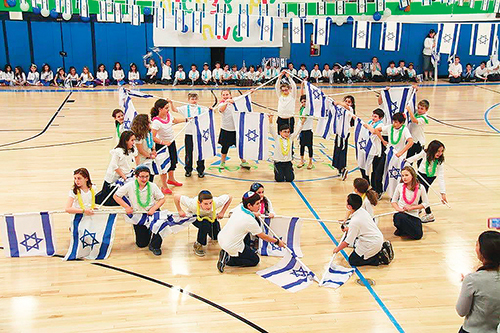


Paramus—The land of Israel will spring to life at Yeshivat Ben Porat Yosef (BPY) as students are immersed in a day-long program celebrating Yom Ha’atzmaut on Tuesday, May 6th. Elementary and middle school students will explore this year’s theme—Israeli culture—through experiential activities in the areas of Israeli music, slang in modern day language, dance, food of different ethnicities, religious sects, finance/economy, religion, sports, leisure time, art, humor, and striving for excellence through technology and entrepreneurial endeavors. The students will rotate to each half-hour session in different rooms throughout the day, taught in Hebrew by Judaic studies teachers. “BPY is not just teaching Eretz Yisroel. It’s living and breathing Eretz Yisroel,” said BPY’s Principal, Rav Tomer Ronen.
Early childhood students will figuratively fly to Israel, get their passports stamped, and explore five areas of Israel through the five senses of touch, sight, hearing, taste, and smell. With a booklet in tow indicating each sense, the children will discern which one is being addressed in each room, where all activities are in Hebrew, and check it off. The sense of hearing will be conveyed as students say tefillot, sing, and dance at the Kotel in real time as the holy site is projected by Kotel Cam onto the smartboard. “We want the children to have an amazing experience that encapsulates what multi-sensory learning is all about. We know children learn best through their experiences and their senses,” said Jessica Kohn, BPY’s Early Childhood Director.
After the day’s activities, students will return to school for more Israeli fun at the evening family program. BPY will be awash in a sea of blue and white as 248 students in grades first through eighth perform daglanut, Israeli flag twirling, for BPY families.
Israeli ambiance is not relegated to Yom Ha’atzmaut alone, but is pervasive throughout the year through the shlichim, teaching emissaries, in the school. This year, BPY employed 11 shlichim in kindergarten through eighth grade, representing over 10% of all of the shlichim residing in North America. The shlichim speak entirely in Hebrew to the students as part of the Hebrew immersion program. Rav Ronen travels to Israel to interview and observe teachers who have been pre-selected and matched to specific schools through the World Zionist Organization. He credits them for contributing to the conversational fluidity of the students and their strong results on the BJE exam.
Each year two Bnot Sherut, post-high school Israeli women serving their Israeli National Service through the Bat Ami program, spread their unique Israeli flavor throughout the school. The Bnot Sherut meet with every class for one period each week teaching Israeli related themes as well as working on special activities and holidays throughout the year.
BPY’s emphasis on experiential learning is evident through various opportunities in addition to Yom Ha’atzmaut. “We want children to love learning. We want them to feel connected to every lesson,” said Ronen, explaining how these hands-on programs engage the students. For example, this year’s fourth grade class recreated the Megillah as students collaborated on writing a play, painting scenery, and performing their production in Hebrew. The third grade class learns Mishnah by engaging students through music, art, movement, and drama, exclusively in Hebrew. Beginning in first grade, students sing as Chumash is taught with Torah cantillations using the traditional Sephardic model and using the Ashkenazic model beginning in fifth grade. During Discovery Learning Days, students engage in experiential activities as they learn STEM (science, technology, engineering and math) revolving around a central theme. Technology through the use of iPads enhances subject matters, whether learning coding or analyzing Nazi propaganda.
BPY was founded in 2001 with the goals of embracing diversity in the Jewish community by teaching Ashkenazic and Sephardic customs and traditions, Hebrew fluency through authentic Hebrew immersion, and creating a learning environment that promotes confidence, critical thinking, and creative learning where each child is viewed as a unique individual. BPY has seen a 300% increase in enrollment since it moved to the Frisch building in Paramus six years ago, with 375 students matriculating this year from nearly 200 families. Classes range from toddler to eighth grade, with the first graduating class of nine students this year, which got 100% acceptance into the high schools of their choice. “I would like every administrator to know all of the children, not by number, but by who they are,” said Ronen, reflecting BPY’s decision to limit its future enrollment to 550 students.
“We look for teachers that care. They look at the children in class like their own. They are team players and go the extra mile,” said Ronen. The general and Jewish studies teachers in each class meet weekly to discuss their students’ progress and monthly through PRIDE, Proactive Response to Individual Differences. As part of PRIDE, the teachers meet with the school psychologist, learning center specialist, and administrators to review and discuss the best approach to meeting each child’s individual needs.
The Early Childhood program’s philosophy is geared towards child-centered, experiential, and small group learning. “We promote risk-taking and critical thinking through inquiry-based learning where we encourage children to ask questions,” said Kohn. The early childhood classes boast a high teacher/student ratio with each class staffed by an English teacher, a Hebrew teacher who speaks only in Hebrew, and assistants, when necessary. The general and Judaic studies curriculum of the elementary and middle schools are based on the school’s pursuit of academic excellence and commitment to reaching each learner as a unique individual.
Whether it’s Yom Haaztzmaut, any holiday, or day throughout the year, BPY’s approach to children seeks to foster their growth. “We are a happy place, where children feel comfortable and are learning without knowing they are learning. We are a community, a home away from home, where children work hard, but have a feeling that they belong and are important,” said Ronen.
For further information about BPY, contact Ruth Roth at [email protected].
By Shelley Fisher













